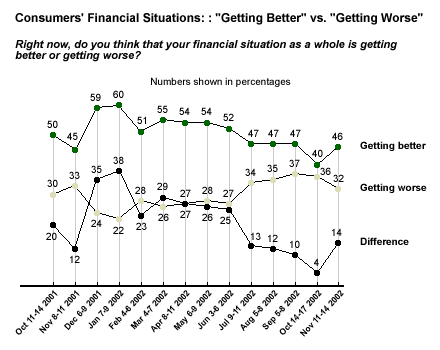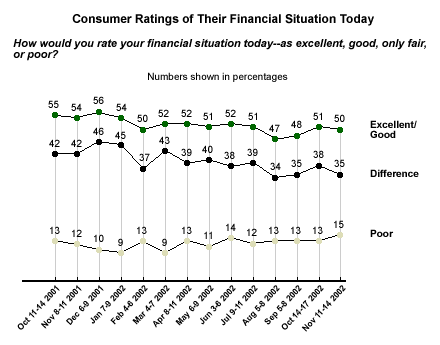A year ago at this time, the U.S. economy was experiencing the benefits of a post-Sept. 11 rally effect. Public support for the president and Congress soared following the terrorist attacks. The Fed cut interest rates 50 basis points to provide liquidity for the economy. The equity markets, which had plummeted, rocketed upward. Consumer optimism about the future of the economy soared.
Could the Republican takeover of Congress produce the same kind of economic rally effect? There are some striking similarities to last year's events. The Fed followed the midterm elections with a 50-basis point interest rate cut. Wall Street is almost giddy about the prospects for investment tax incentives. The Dow continues to improve, having completed its sixth consecutive weekly increase. And there are some signs that consumer confidence is improving.
Will consumer optimism about the economy's future soar once more in the months ahead? Will holiday spending be surprisingly strong, making the year for many retailers? Will the country begin to experience a real economic recovery early next year?
More Consumers Say Their Financial Situation Is Getting Better
Post-election Gallup polling conducted Nov. 11-14* shows that 46% of Americans say their financial situations as a whole are getting better, while 32% say they are getting worse. This 14% difference in favor of those saying their situation is getting better is substantially improved from last month's margin of 4%. It is also nearly equal to the 12% difference that existed a year ago.
In the months following November 2001, the difference in favor of those saying their financial situation was getting better surged to 35% in December and peaked at 38% in January 2002 -- 60% of American consumers said their financial situation was getting better and 22% said it was getting worse. Clearly, this post-Sept. 11 economic rally effect created a significant increase in consumer optimism that carried throughout the 2001 holiday season.

But, Consumers Still Likely to Be Negative About Their Current Financial Situations
This month, 50% of Americans rated their current financial situation as excellent or good while 15% rated it as poor. This 35% difference in favor of those saying their situation is excellent/good is down from last month, when the difference was 38%. It is also down from the 42% difference that existed a year ago.
After November 2001, the margin in favor of those saying their current financial situation was excellent/good edged up to 46% in December. The margin was 45% in January 2002 -- 54% of American consumers said their current financial situation was excellent/good while only 9% said it was poor. While the post-Sept. 11 economic rally effect created a significant increase in consumer optimism, it produced a relatively modest improvement in the way consumers viewed their own personal financial situations in late 2001 and early 2002.

Key Points
The economic rally effect following last year's terrorist attacks is an example of "emotional economics." American consumers had a potent emotional reaction to the way war was brought onto U.S. soil. These emotions combined with the Fed's action and zero-interest financing to create real optimism that the nation's leaders would succeed in getting a strong recovery going in early 2002. The real-world impact of this emotion-based optimism -- a surge in consumer confidence about the future of the economy -- produced a buying spree that not only saved the 2001 holiday season for retailers, but also produced a significant increase in economic growth during the first quarter 2002.
Unfortunately, consumers did not see their personal situations improve in early 2002 as they had expected. Public expectations about the economy therefore deteriorated as last year's rally effect dissipated. Now, consumers perceive their personal financial situations less positively than they did a year ago.
Republican control of Congress has made Wall Street very optimistic that government will take some pro-business, pro-investor actions early next year. Combined with the improved equity markets and the Fed's action, these events have increased consumer optimism about the future.
However, this year's post-election economic rally effect is going to be much more muted and much less emotional than last year's. Consumers aren't going to spend as freely as they did last year; they will be more cautious and wait until they see real improvements in their own situations before they spend. This year's "economic rally effect" is not likely to save retailers during this holiday season, nor is it likely to stimulate an economic recovery in early 2003.
* Results are based on telephone interviews with 1,001 national adults, aged 18 and older, conducted Nov. 11-14, 2002. For results based on the total sample of national adults, one can say with 95% confidence that the maximum margin of sampling error is ±3%.

